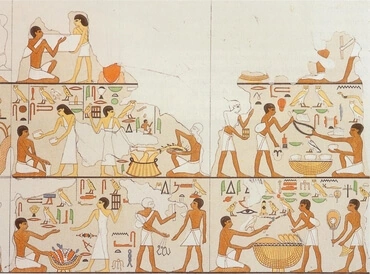Egypt

In the Bible, Egypt represents knowledge and the love of knowledge. In a good sense that means knowledge of truth from the Lord through the Bible, but in a natural sense it simply means earthly knowledge to be stored up and possessed. And even knowledge from the Bible is not always good: If we learn them with the goal of making them useful, then they are filled with angelic ideas. But they lack purpose when they are learned only for the sake of knowing things or for the reputation of being learned. So Egypt is a place you go to learn things, but to become heavenly you have to escape the sterile "knowing" and journey to the land of Canaan, where the knowledge is filled with the internal desire for good. It's interesting that when Egypt was ruled by Joseph, it was a haven for his father and brothers. This shows that when a person's internal mind rules in the land of learning, they can learn much that is useful. But eventually a pharaoh arose that didn't know Joseph, and the Children of Israel were enslaved. The pharaoh represents the external mind; when it is in charge the excitement and self-congratulation of knowing can reduce the internal mind to a type of slavery. The mind - like the Children of Israel - ends up making bricks, or man-made falsities from external appearances.
God

When the Bible speaks of "Jehovah," it is representing love itself, the inmost love that is the essence of the Lord. That divine love is one, whole and complete in itself, and Jehovah also is one, a name applied only to the Lord. The divine love expresses itself in the form of wisdom. Love, then, is the essence of God -- His inmost. Wisdom -- the loving understanding of how to put love into action -- is slightly more external, giving love a way to express itself. Wisdom, however, is expressed in a great variety of thoughts and ideas, what the Writings collectively call divine truth. There are also many imaginary gods, and sometimes angels and people can be called gods (the Lord said Moses would be as a god to Aaron). So when the Bible calls the Lord "God," it is in most cases referring to divine truth. In other cases, "God" has reference to what is called the divine human. The case there is this: As human beings, we cannot engage the Lord directly as divine love. It is too powerful and too pure. Instead, we have to approach Him by understanding Him through divine truth. Divine truth, then, is the Lord in human form, a form we can approach and understand. Thus "God" is also used in reference to this human aspect, because it is an expression of truth.
This video is a product of the New Christian Bible Study Corporation. Follow this link for more information and more explanations - text, pictures, audio files, and videos: www.newchristianbiblestudy.org
This video is a product of the New Christian Bible Study Corporation. Follow this link for more information and more explanations - text, pictures, audio files, and videos: www.newchristianbiblestudy.org








